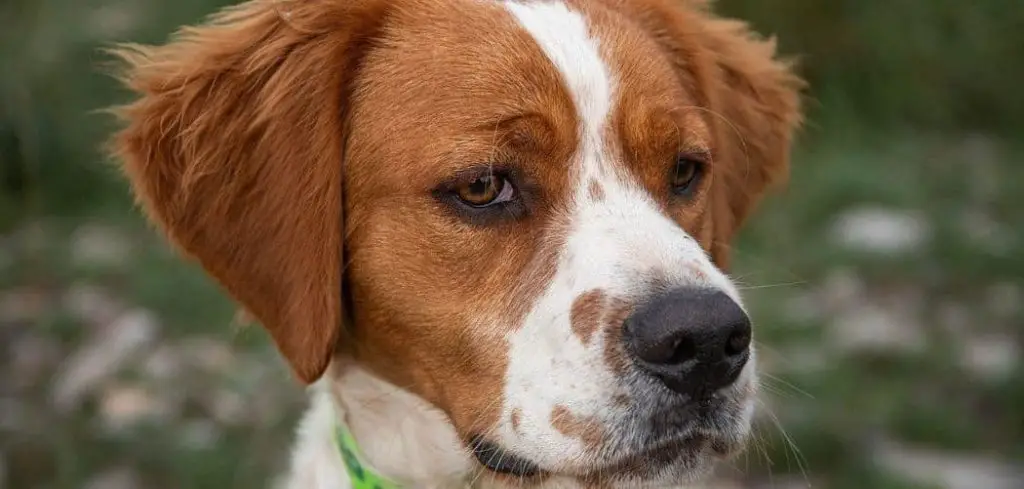If your dog is licking their lips excessively, it may seem like a quirky habit—but it could actually be a sign of discomfort, anxiety, or a medical issue.
Occasional lip licking is normal, but frequent or obsessive behavior deserves a closer look.
We outline the common causes of dog licking lips excessively, what you can do at home, and when to seek veterinary help.
Table of Contents
Dog Licking Lips Excessively — Why It Happens
Excessive lip licking in dogs is often linked to nausea, dental pain, anxiety, oral irritation, or a foreign object in the mouth. It may also be a response to certain smells, a sign of submission, or a warning of an underlying health problem.
Paying attention to when and how your dog licks their lips can help uncover the root cause.

Common Causes of Dog Licking Lips Excessively
Nausea or Upset Stomach
One of the most common causes of lip licking is nausea. When dogs feel sick to their stomach, they produce excess saliva and may lick their lips to cope.
You might also notice drooling, loss of appetite, or grass eating. Vomiting may follow.
Nausea can stem from dietary indiscretion, illness, or more serious conditions like pancreatitis.
Anxiety or Stress
Dogs often lick their lips when they’re nervous or stressed. It’s a calming signal often seen during vet visits, thunderstorms, or unfamiliar environments.
If your dog’s lip licking coincides with pacing, whining, panting, or avoiding eye contact, anxiety is a likely cause.
Reducing stress and offering calming tools may ease the behavior.
Dental or Oral Pain
Toothaches, gum disease, or oral injuries can make your dog lick their lips to relieve discomfort.
Look for signs like pawing at the mouth, bad breath, bleeding gums, or refusal to eat hard food.
Dental exams and cleanings are essential to prevent worsening pain or infection.
Foreign Object in the Mouth
A stuck object—like a piece of bone, stick, or toy—can trigger constant lip licking as your dog tries to dislodge it.
You might see your dog pawing at their face, gagging, or refusing food. Sometimes the object is lodged under the tongue or between teeth.
This is a vet emergency, especially if breathing is affected.
Seizure Activity or Neurological Issues
In rare cases, repetitive lip licking may signal focal seizures or neurological dysfunction.
If the licking seems involuntary, is paired with confusion or unresponsiveness, or your dog zones out while doing it, seek veterinary help immediately.
Videoing the behavior can help your vet assess whether it’s seizure-related.
Liver Disease or Toxin Ingestion
Dogs with liver dysfunction or those who’ve ingested a toxin may drool or lick excessively due to nausea or confusion.
Watch for vomiting, yellow eyes or gums (jaundice), or changes in behavior.
Early vet care can make a huge difference in these cases.
What to Do If Your Dog Is Licking Their Lips Excessively
Observe when and how often your dog is licking. Is it after meals? During stressful events? While resting?
Check the mouth for visible injuries, bad breath, swelling, or trapped objects. Only inspect gently—don’t force your dog’s mouth open.
Avoid offering treats or food until you determine whether nausea or oral discomfort might be the cause.
Create a calm environment and offer soothing contact if anxiety is suspected. Try not to scold the behavior.
Record the behavior and note any patterns—it may help your vet diagnose the underlying issue.
When to Call or Visit Your Vet
Contact your vet promptly if your dog:
Licks their lips obsessively or suddenly
Refuses food or vomits
Has visible mouth injuries or swelling
Acts confused, dazed, or unresponsive during the licking
Has ongoing signs of discomfort or pain
Lip licking can be subtle but meaningful. Persistent or unusual behavior should always be evaluated to rule out health concerns.
Related
Read more: Dog Drooling Excessively (Could it be nausea or dental pain?)
Read more: Dog Licking Paws Excessively (What it means)
Key Takeaway
If your dog is licking their lips excessively, it could be a sign of something more than habit. From nausea and stress to dental pain or toxins, many causes need attention.
Keep a close eye on your dog’s symptoms and consult your vet if the behavior continues or worsens. Early intervention leads to faster relief and peace of mind.
